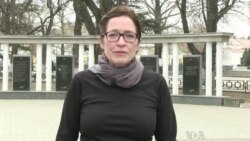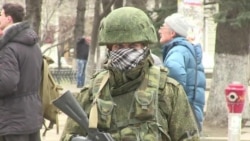SIMFEROPOL, CRIMEA —
Armed men have patrolled the streets of the Crimean capital for days.
They can be seen outside parliament, at the regional airport, and in the center of Simferopol.
As Western nations condemn what they've called Russia's naked aggression, Moscow insists it has not deployed troops beyond the bases it leases from Ukraine.
Neither of the dueling narratives about events in Crimea seem to have much resemblance to what's going on here.
At a checkpoint near Crimea's Belbek airport, not far from a stand-off between Ukrainian and Russian forces, the idea of exceedingly professional "self-defense forces" continues.
I asked men who were clearly volunteers on one side about the men on the other -- with their guns, vehicles and uniforms of questionable origin.
Andrei, in calmer times a landscape gardener, preferred not to show his face.
"This vehicle and these people are armed self-defense," he said in Russian.
I asked him if they were Ukrainian.
"They're ours," he said. "Every [nationalities] is here. Not ours, but every [nationality]: Russians, Ukrainians, Armenians, Tatars."
I asked is it an army?
He answered "No, it's a vigilante group."
Moscow said it’s beefed up its presence to protect ethnic Russians under attack by Ukrainian nationalists over language and politics -- persecution it claims is orchestrated by the new pro-Western government in Kyiv.
But on the streets of Simferopol, pro-Russia sentiment holds sway. Crimea’s local parliament has clearly aligned itself with Moscow, and the only apparent threat is to some Ukrainian soldiers who’d been surrounded on their military bases.
Even the mystery soldiers who put on a show of force for cameras outside parliament and at the regional airport last week have withdrawn.
Politicians in Kyiv, however, have warned of imminent conflict between the Ukrainian and Russian militaries – including reported threats of ultimatums that Russia denies.
But the will to fight by either party, at least here in Crimea, is questionable. The region, part of Ukraine but with long ties to Moscow, is common to both.
And the soldiers themselves, despite the war of words between their leaders, appear to be showing remarkable restraint.
Related report: Who Are Those Armed Men in Crimea?
They can be seen outside parliament, at the regional airport, and in the center of Simferopol.
As Western nations condemn what they've called Russia's naked aggression, Moscow insists it has not deployed troops beyond the bases it leases from Ukraine.
Neither of the dueling narratives about events in Crimea seem to have much resemblance to what's going on here.
At a checkpoint near Crimea's Belbek airport, not far from a stand-off between Ukrainian and Russian forces, the idea of exceedingly professional "self-defense forces" continues.
I asked men who were clearly volunteers on one side about the men on the other -- with their guns, vehicles and uniforms of questionable origin.
Andrei, in calmer times a landscape gardener, preferred not to show his face.
"This vehicle and these people are armed self-defense," he said in Russian.
I asked him if they were Ukrainian.
"They're ours," he said. "Every [nationalities] is here. Not ours, but every [nationality]: Russians, Ukrainians, Armenians, Tatars."
I asked is it an army?
He answered "No, it's a vigilante group."
Moscow said it’s beefed up its presence to protect ethnic Russians under attack by Ukrainian nationalists over language and politics -- persecution it claims is orchestrated by the new pro-Western government in Kyiv.
But on the streets of Simferopol, pro-Russia sentiment holds sway. Crimea’s local parliament has clearly aligned itself with Moscow, and the only apparent threat is to some Ukrainian soldiers who’d been surrounded on their military bases.
Even the mystery soldiers who put on a show of force for cameras outside parliament and at the regional airport last week have withdrawn.
Politicians in Kyiv, however, have warned of imminent conflict between the Ukrainian and Russian militaries – including reported threats of ultimatums that Russia denies.
But the will to fight by either party, at least here in Crimea, is questionable. The region, part of Ukraine but with long ties to Moscow, is common to both.
And the soldiers themselves, despite the war of words between their leaders, appear to be showing remarkable restraint.
Related report: Who Are Those Armed Men in Crimea?










